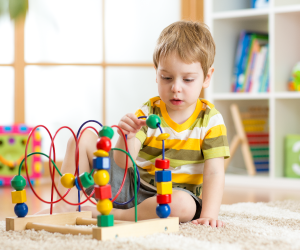Have you ever wondered how independent your child actually is? Will your child be able to look after themselves if left alone for a while? Do you think your child is well-equipped with essential life skills to face the world?
 Think about it!
Think about it!
It’s absolutely important for children to learn more than just academically.
And no, enrolling them in various activity classes isn’t enough either.
But don’t worry, we’ll tell you what these important skills are & how to teach them to your child!
If your child can’t look after themselves, they can’t develop essential life skills or the important personality traits developed alongside them.
RELATED: 12 Good Habits Every Parent Must Teach Their Child
Life skill education simply cannot stop with the exposure your child receives in school. To learn its importance, a child needs to be taught at home through experiences and training activities.
 Says Dr Amrita Basu Misra from Health wealth bridge, “When you want your child to grow up strong, you want to teach by example. It’s not easy being a parent. It’s even more difficult to work on self-improvement while raising a child.”
Says Dr Amrita Basu Misra from Health wealth bridge, “When you want your child to grow up strong, you want to teach by example. It’s not easy being a parent. It’s even more difficult to work on self-improvement while raising a child.”
So, let’s first look at a few skills that are essential for any growing child to learn in order for them to find it easy to deal with adulthood.
Let’s also look at how you can teach your child these skills.
18 life skills to equip your child with

1. Basic self-defence
I’m sure you’ll agree that in today’s world especially, safety is of utmost importance, and developing self-defence not only makes the child feel more independent, but also more confident.
Basic self-defence is a must — be it for your son or daughter. Most schools these days invest in teaching basic self-defence to children. But if your child’s school does not, don’t hesitate to send them for classes outside.
RELATED: Good Touch Vs Bad Touch: 5 Easy Ways To Educate Your Child
2. First-aid and the importance of health
You can’t expect to always be around whenever your child gets hurt, a bite or a rash! So how about empowering them such that they are able to take care in case of an emergency until they reach a grown-up?
This is essentially something the child’s schooling should cover but I strongly encourage its reinforcement at home by teaching your child essential first aid steps.
And this you can do by showing them a first aid kit and its contents. Children are, after all, excellent learners!
Another important skill is teaching your child to take care of their health. Instead of forcing your child to eat vegetables, talk to them about health risks in eating junk food all the time and explain how the healthy food will benefit them in a way that they can apply to themselves.
RELATED: 20 Tips To Improve Your Child’s Appetite
Eg: For a kid interested in sports, talk about foods that give them increased stamina and agility, enabling them to play better at their sport.
For kids that care about physical appearance traits such as hair, talk about the importance of Omega-3 fatty acids and the foods that contain it.`
3. Make them do their own work
Let’s face it. When our kids grow up, they are very likely to leave home to pursue their education or career. And if they aren’t taught responsibility and daily-living skills today, it would be a problem for them in the future.
Most parents run around doing everything for their children so much so that the child doesn’t get involved in anything. This shouldn’t be the case.
Be it putting their school bag together or taking the plate to the kitchen, ensure your child is ‘responsible’ for their work. Teach these skills now, before it’s too late! And there will be another helping hand at home, isn’t it? 🙂
PRO TIP: You can also try an activity box like Flintobox to make a child learn and develop skills independently. The activities in Flintobox are highly educational where children learn concepts and life skills through play! To find out more about Flintobox, visit this link >
4. How to manage time
 You’re probably wondering how. Well, you can do this by getting your kid to claim responsibility for their own time.
You’re probably wondering how. Well, you can do this by getting your kid to claim responsibility for their own time.
Do this by getting them an alarm clock that they can use to wake up on time for school, instead of you waking them up.
Get them a planner to use to track their school work and other extra-curricular work and to keep track of what needs to be done by when.
RELATED: 12 Must-Try Extracurricular Activities For After-school Engagement
When they do this, they will automatically begin to allow specific amounts of time for play and for work.
5. Decision-making skills
Education, career, life partners — there are so many important decisions we need to make in our lives. How about instilling the skill of making appropriate decisions at an early age itself in your child?
Here’s how to — teach them in small and simple ways how to make wise decisions. Start by asking them to choose between 2 activities or games; 2 different types of clothes; 2 different food items, etc.
Once this happens, the child will understand the consequences that each decision causes. So guide your child through the process, help them weigh the advantages and disadvantages before they make their decision!
6. Managing money & basic budgeting
 This is one of the essential skills to develop. Give your children a certain amount of pocket money every week or every two weeks that they have to use for their expenses.
This is one of the essential skills to develop. Give your children a certain amount of pocket money every week or every two weeks that they have to use for their expenses.
If they wish to buy something a little more expensive, ask them to save up their pocket money to buy it.
Or, you can lend them a helping hand by telling them that for every chunk of money they save, you’ll add a certain amount of money to their fund for buying the product.
This will motivate them more. I think the concept of comparative shopping also comes under the concept of teaching your child about budgeting.
Tell them why you choose comparatively cheaper options sometimes. When they want to buy a few things when you go shopping, encourage them to pick one or two items if they’re of the same kind.
This kind of budgeting training develops a habit in your child to not waste money and to respect its value.
 Says Neha Tambe, “I believe understanding the importance of money and managing it is something that every child above the age of 10 should know.
Says Neha Tambe, “I believe understanding the importance of money and managing it is something that every child above the age of 10 should know.
They are introduced to the concept of money from the age of 7 in school via subjects like Maths but nobody teaches them the importance and relevance of budgeting, planning, saving and the real value of money as they have never handled money in real life.
Open a bank account for your child, ask them to deposit some money every month (money received as gifts or if they help out in the house with some tasks you could pay them a small amount.) This will inculcate the habit of saving and appreciating money.” Wouldn’t you agree?
7. How to shop
 Always take your child grocery shopping with you. Once your child knows where the different categories of items are shelved, give them a basket and ask them to get a few easy-to-find things for you.
Always take your child grocery shopping with you. Once your child knows where the different categories of items are shelved, give them a basket and ask them to get a few easy-to-find things for you.
You can also keep your kid in charge of buying a few things every month. Examples of this would be snacks and juices. Once done, teach them how to pay for it!
And the most important point — don’t forget to model smart shopping yourself!
8. Involve them in simple cooking
Children can cook, too! Don’t you agree?
And you can start with simple things! Teach your child how to make their own peanut butter and jam sandwiches, teach them how to butter a slice of bread, and how to make a salad.
Have them tear up greens, squeeze lemons, and put chopped vegetables together to make a salad.
You can also get them to help you with baking, with handing you ingredients while you cook or with keeping the kitchen table clean while you’re preparing a meal.
9. Importance of environmental preservation
Instilling the importance of environment and sustainability at an early age will teach your child to be more loving towards the planet. Teach your kid why preserving the environment is essential by making small lifestyle changes at home. Get them to practise eco-friendly habits in everything they do.
You can also make them do environmental activities such as gardening and collecting waste to throw in a bin. If you have a yard, give them a portion of the yard to plant whatever they like in.
Help them sow seeds and make it their responsibility to water the plants. If you don’t have a yard, you can always use planting pots.
10. Finish tasks independently
Let your children do their own tasks. Let them pack their own school bag, make their own bed, and even pack their own lunch!
You can do this by making each task a bit exciting by helping them out. Buy them new bedding and cushions themed around a cartoon or movie they love.
Have a sandwich station or a pancake station for breakfast with cut-up fruits, jams, syrup, spreads, etc, so they can make their own plate and eat it the way they like.
11. How to interact with people
We’ve all taught children about stranger danger but this doesn’t make much logical sense considering every person we’re close to as adults was a stranger to us at some point.
Instead, teach your children to do exactly what adults do. Teach them to differentiate between good strangers and bad strangers. Teach them how to interact with good strangers.
Teach them how to make friends, how to be friendly to good adults, and just how they should go about interacting with these people.
If you think about it, a task that we do every single day is to be engaged in interaction with people. If we don’t teach children this at a young age, they may not develop positive social skills.
12. Cleaning and other household chores
Now I know what you’re thinking. Getting kids to get involved in cleaning activities is really hard! We agree. But we assure you that your effort will be well worth it!
Start small by just asking them to keep their room clean, make their bed, and make sure everything they own is in its right place. You can then ask them to clean the dishes that they use to eat after eating as well.
You can ask them to dust the tables one day and ask them to take the trash out on another; you can also ask them to set the table in whichever way they think looks the best and ask them to get creative with it
RELATED: 11 Ways To Foster Creative Thinking In Your Child
Ask them to participate in chores such as these to help you out or in exchange for their allowance.
It’s important to practise these activities both in the context of an allowance and out of it, so your child learns to just help out without being given anything in return, too.
13. Basic etiquettes & how to order at restaurants
Teach your kid about how to behave at a restaurant and how to place an order. Ask them to place their own orders and decide on what they want to eat on their own.
Also teach them how to eat with a knife and fork, how to place the knife and fork on the plate once they’re done eating, and on how to tip the waiters.
14. How to use maps
Going somewhere? Start off by teaching your kids the routes around your house and test this by asking them to direct you home or to school the next time you’re dropping them.
You can then ensure that your child learns how to read a map, and also teach them how to use a GPS and follow its instructions.
15. Wash, wash, wash your clothes
Involve them in household chores such as doing the laundry. You can teach them how to turn on the washing machine, what kind of clothes to wash separately, how much detergent to use, how to turn on the dryer, etc.
16. Basics of travelling
 Aside from navigation, your child should know travelling basics.
Aside from navigation, your child should know travelling basics.
From learning to ride a cycle to learning how to use public transport, make sure your child knows how to do these things along with routes.
Teach them how to buy metro or bus tickets, teach them the basics of which metro train or bus goes to your house from school.
These are important skills that your child will need for later as well as for emergencies.
17. Looking at situations from others’ perspectives
When your child comes to you about a problem that he or she had with their friend or a problem that they witnessed, encourage them to look at the situation that took place from the perspective of others.
Even explain the emotional reactions of people every chance you get. Explain why someone is sad or angry.
This increases their problem-solving abilities and their level of understanding of the people around them greatly.
18. Resilience & Adaptability
Another important skill would be to teach your child to be resilient. How you can do this is by ensuring you don’t feed your child with solutions all the time.
Empower your child to problem-solve by themselves so that they’re ready to face challenges as and when they come. They must learn resilience to adapt to different changes and different environments.
Make sure you have an open channel of communication to understand what your child is going through and help them out — and of course, as a parent, you too must model resilient behaviour at home!
Conclusion
By the time a child is six or seven, they’ve developed the foundation of their personality and this kind of life skill development really enhances positive personality traits.
At this age point, your child should be fairly independent in the way they function inside the house. They should also be following any safety rules that you lay down for them, which goes to show the personality trait of understanding and reasoning.
A few more life skills that Dr Amrita Basu Misra suggests are — teaching children kindness, positivity, patience, persistence, believing in oneself, and working hard.
Developing life skills is important so our kids have a brief idea of what they want to do in life and essentially keep in mind the kind of person they want to be.
Let’s focus on educating our children in a way that they find fun and entertaining so we can be worry-free when it comes to their morals and skills!
Have we missed an essential life skill? Just drop a comment and let us know what you feel is important for a child to develop!









9 Sure-Fire Ways To Handle A Stubborn Child [Expert Tips] - olivebabyshop.com
[…] 18 Essential Life Skills To Equip Your Child For The Real World […]
Jatin mahore
Hey, this post is informative. keep writing these type of blogs.
Thank you!
SANJAY YADAV
I would like to give a tonnes of applause to the writer who ,after having had such an insight into the prerequisites of living an ideal life , presented the valuable information.
Anupam Chatterjee
In today’s world the Kids at an age group of 5 -7 Years should also being taught the a. Tolerance and b. Giving back to society: like less demanding, planting of trees, stop spoiling the environment with carbon footprints. That’s my view point.
Gayathri G
Nice ideas, Anupam! Thank you for sharing this with us 🙂